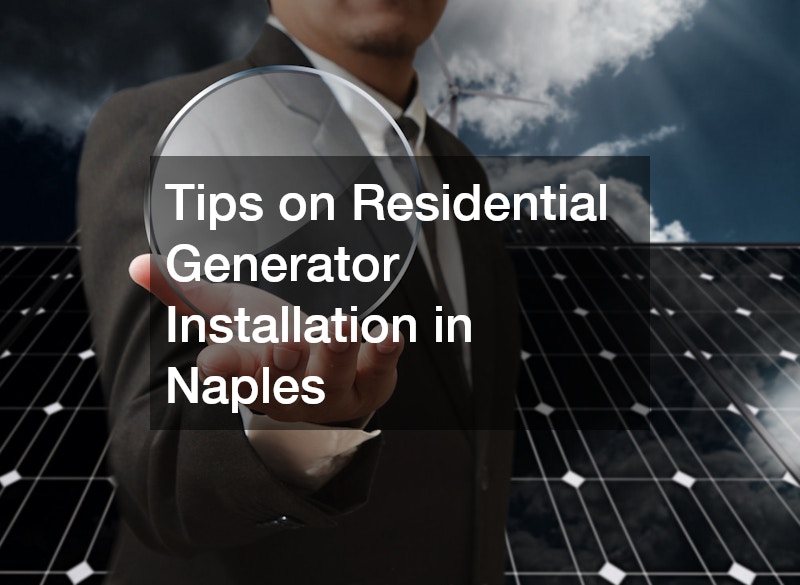Living in Naples, Florida, brings the advantage of beautiful weather and coastal living but also the challenge of hurricanes and power outages. Having a residential generator can provide peace of mind and continuous power during these interruptions. Installing a generator is a significant investment that requires careful planning and consideration. Here are some essential tips to ensure a successful residential generator installation in Naples.
Assess Your Power Needs
The first step in installing a residential generator is to assess your power needs.
Determine which appliances and systems are critical during a power outage. These may include refrigerators, HVAC systems, medical equipment, lighting, and security systems. Make a list of these essentials to understand the capacity of the generator you will need. Consulting with a professional electrician can help you accurately calculate your power requirements.
Choose the Right Type of Generator
There are various types of generators, including portable, standby, and inverter generators. For residential purposes, standby generators are typically the best option. They are permanently installed outside your home and connected to your electrical system. Standby generators automatically turn on during a power outage and provide a seamless transition. They are powered by natural gas or propane, making them a reliable choice for long-term use.
Select the Proper Size
Choosing the right size generator is crucial. A generator that is too small won’t be able to power all your essential appliances, while one that is too large can be unnecessarily expensive and inefficient. Generator sizes are measured in kilowatts (kW). For a typical home in Naples, a generator ranging from 20 kW to 25 kW is usually sufficient. However, the exact size will depend on your specific power needs.
Obtain Necessary Permits
Before installing a generator, it’s essential to check local regulations and obtain the necessary permits. Naples has specific codes and regulations for generator installations to ensure safety and compliance. Your installation contractor should be familiar with these requirements and help you navigate the permitting process. Failing to obtain the proper permits can result in fines and delays.
Choose a Reputable Contractor
Selecting a reputable contractor is one of the most critical steps in the installation process. Look for contractors with experience in generator installations, positive reviews, and proper licensing and insurance. A professional contractor will ensure that the installation is done correctly and safely. They will also handle the necessary permits and inspections, saving you time and hassle.
Consider Fuel Source and Storage
Generators can be powered by natural gas, propane, or diesel. In Naples, natural gas and propane are the most common choices for residential generators. Natural gas is convenient as it connects directly to your home’s gas line, providing an uninterrupted fuel supply. Propane requires a storage tank, which can be an additional expense but offers a reliable fuel source during extended outages. Discuss the pros and cons of each fuel type with your contractor to determine the best option for your home.
Ensure Proper Placement
Proper placement of your generator is crucial for safety and efficiency. Generators should be installed on a level surface outside your home, away from windows, doors, and vents to prevent carbon monoxide poisoning. The generator should also be easily accessible for maintenance and repairs. Additionally, consider the distance from the fuel source and the main electrical panel when determining the installation location.
Plan for Maintenance
Regular maintenance is essential to keep your generator in optimal working condition. Most manufacturers recommend annual maintenance, which includes checking the oil, filters, spark plugs, and battery. Scheduling regular maintenance with a professional technician can help identify potential issues before they become significant problems. Additionally, running the generator periodically can ensure it remains operational when needed.
Install Transfer Switches
A transfer switch is a critical component of a generator installation. It allows the generator to safely power your home’s electrical system by isolating it from the utility lines. This prevents backfeeding, which can be dangerous for utility workers and damage your generator. Automatic transfer switches are ideal as they detect power outages and automatically switch the power source to the generator.
Test Your Generator
Once the installation is complete, it’s essential to test your generator to ensure it functions correctly. Conducting a test run can help identify any issues and provide peace of mind that your generator is ready for use. Your contractor should guide you through the testing process and demonstrate how to operate the generator.
.

